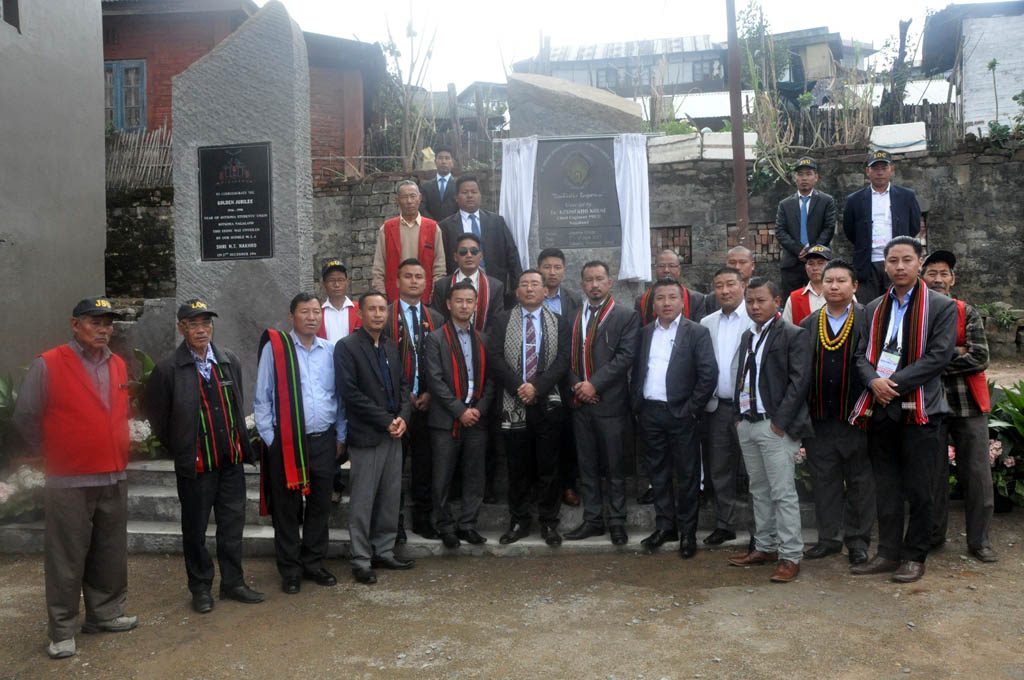
Jotsoma, April 8 (EMN): Chief Engineer of Public Health Engineering Department, Er. Kevisekho Kruse Saturday exhorted the student community to live a dignified life as they strive to become responsible citizens of the Naga society.
Speaking at the inaugural function of the 27th biennial general conference of the Angami Students’ Union (ASU) at Centenary Compound, Jotsoma village, Er. Kruse advised students to learn to struggle in the first place rather than think about their comfort and enjoyment.
“First learn to struggle and let not your comfort follows,” Kruse said adding “one have to chase success if he/she aims to excel higher.”
Dwelling on the conference theme “Realistic Response,” Er. Kruse shared his concern on the ever increasing problems of the Naga society. “Our problems would be solved once we learn to struggle,” he said and expressed hope that students will shoulder the responsibility to bring about a change.
“Until and unless we toil ‘very hard’ to bring changes, the problems will continue to remain with us. If we are to progress, it is us (Nagas) who should make things happen,” he asserted adding “there lies a huge responsibility on the present generation to push our State towards a progressive society.”
“This is our time, and so if we fail to do what we should be doing or fail to contribute positively for the wellbeing of our society, it will become a huge burden to us later. So let us do what is possible on our part when the time is in our hands,” he urged.
On his observation that there are many Nagas who lives an extravagant life by selling their lands, Kruse considered this as “foolish” and “irresponsible.” To live a luxurious and comfortable life, he said “one should do it through his/her earning and not by the money that comes by selling the land(s) of your parent’s inheritance.” Can a lifestyle such as this be considered as “realistic response?” he wondered.
Addressing a host of students, mostly undergraduates, he advised them to expand their horizon and also urged them to increase their network of connectivity if they wish to progress further.
“Let us not isolate ourselves from the rest of the world. We cannot afford to live in our own compartment alone. By getting connected with more and more people, it will help us to progress further,” he said.
Stating that India is a country which is changing at a fast pace, he encouraged the students to avail the opportunities to their own advantage.
“The present government at the centre, unlike the past, has a strong thrust on infrastructural development. Infrastructural development will come with its time, but beyond that, it is us who have to struggle to stand on our own feet,” he added.
Reiterating his concern for the upcoming generation to live a dignified life, he regretted that, Nagas, in the eyes of others, are placed in a weak position for being unproductive. “Many a times, we are not in a position to raise our heads high, and this is a shame,” he pondered.
“If we decide to do nothing, we will collapse, our society and our government will collapse,” he challenged the students.
On the advancement of Kohima city, he also felt that responsibility lies on the Angami people, particularly the students, since they are the original inhabitants.
To make Kohima business friendly, he foresee that major enhancement will rely on the power of connectivity that would be built among the denizens, while he further told the student community to initiate in making the capital city neat and clean.
Delivering the solidarity message, speaker of the Naga Students’ Federation (NSF), Joshua Thong lauded ASU for being one of the strongest backbones of the federation.
“It is expected of you to push NSF to greater heights,” Thong said.
On Naga political issue, Joshua, while lauding the efforts of the Angami community in spearheading the movement in the past, shared his expectation that the Angamis will continue to be the binding force to bring together all Naga political groups even in the days to come.
“We are comfortable shifting the blame on others. If everybody remains to be a mere spectator, then our whole society will be in trouble for years to come,” he said.
“Unless we redirect and carry our responsibilities, our future is bleak,” he added.
Against the opinion of many Nagas who tend to come to a conclusion that “the Nagas have no future,” the NSF speaker rubbished this opinion stating that “we have a future, and a bright future.”
“We don’t need magic or extraordinary powers to change things. We have the power to think and to act. And I believe we can do it,” he asserted.
“The crucial importance is our unity. Let it be our constant effort to move towards greater heights,” he urged.
The president of Angami Public Organisation, Dr. Vilhusa Seleyi encouraged the students to be self dependent and productive and further strive in the effort to achieve success. He also told the students to give maximum effort to preserve the rich cultural heritage of the Nagas and the community in particular.
The programme, chaired by Kelhouneizo Yhome, convenor organising committee, commenced with invocation pronounced by Rokophreto Nagi, Assistant pastor of Calvary Baptist Church. ASU presidential address was delivered by Dievi Yano, while a cultural dance was presented by WASU and a song by Vilakhonuo Keditsu.
Earlier, the guest speaker also unveiled the monolith of the 27th ASU biennial general conference erected near the Jotsoma village council hall.

